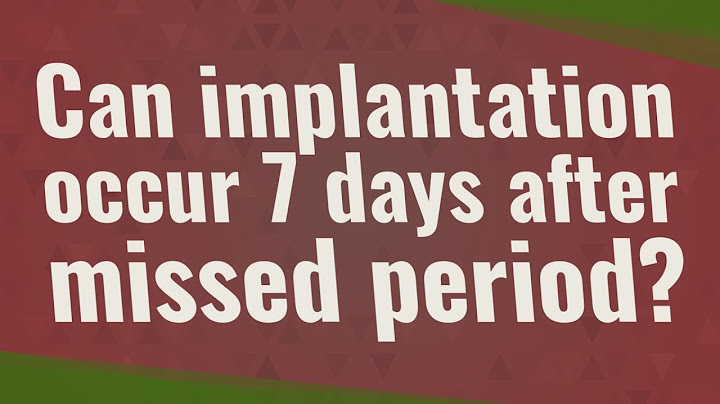Implantation bleeding is light bleeding that may happen about six to 12 days after conception. It may be caused by a fertilized egg implanting in the blood-rich lining of your uterus. Implantation bleeding can be an early sign of pregnancy, but some women mistake it for menstrual blood because it may happen around the time they expect their period. Show
Implantation bleedingImplantation bleeding is light bleeding that a small percentage of pregnant women have at about six to 12 days after fertilization. Here's the theory behind why it happens: After the sperm fertilizes the egg, it starts the three- or four-day trip from the fallopian tube to your uterus. During this time, it divides into hundreds of identical cells. Meanwhile, your ovaries release estrogen that causes the lining of the uterus (the endometrium) to thicken and develop more blood vessels. The uterine lining is preparing to host the quickly growing egg that will soon become an embryo. Once the egg enters the uterus, it's called a blastocyst, a tiny ball of several hundred cells. A day or two later, it begins burrowing into the blood-rich lining of your uterus, where it continues to grow and divide. As it burrows into the endometrium, the blastocyst may cause little blood vessels to burst, resulting in a small amount of vaginal bleeding. Implantation bleeding symptomsIn addition to light bleeding, some women also have these other implantation symptoms:
Note that these symptoms are no guarantee that you're pregnant – they can also be signs of ovulation or PMS. Taking a home pregnancy test is the best way to find out if you're pregnant. (Though you may have to wait a few more days to get an accurate result.) If you do get your period instead of a positive pregnancy test, and haven't yet scheduled a preconception visit with a midwife or doctor, now is a good time to do so. When does implantation bleeding occur?Implantation bleeding tends to occur during the week before you would expect your period, or about six to 12 days after conception. This is around the same time a fertilized egg would be attaching itself to the uterine lining. How long does implantation bleeding last?Unlike a regular menstrual period, implantation bleeding usually lasts no more than a day or two. This is the amount of time it takes for the fertilized egg to become implanted into the lining of the uterus. How common is implantation bleeding?By some estimates, about 15 to 25 percent of women experience implantation bleeding. Some women may think they’re having a light period when they see the spotting. They may not realize they're pregnant. How can I tell if it's implantation bleeding or my period?Here's how to tell whether your bleeding is more likely to be implantation bleeding or your period:
When to see a doctor for bleeding in early pregnancyIf you continue spotting even after a positive pregnancy test, or if you develop other symptoms (such as pelvic or abdominal pain, dizziness, or lightheadedness), call your provider immediately. You may need an exam to make sure you don't have an ectopic pregnancy. This happens when the fertilized egg grows outside the uterus, usually in a fallopian tube. (It's possible to have an ectopic pregnancy even if you don't get a positive result on a pregnancy test.) Bleeding or cramping in early pregnancy may also be a sign of an impending miscarriage. But many women spot in the first trimester for no apparent reason and go on to have a completely normal pregnancy. Learn more: Quiz: Am I pregnant? Video: What is implantation bleeding? When a fertilized egg implants in the uterus, which usually happens 10 to 14 days after conception, it sometimes causes part of the uterine lining to shed. When this occurs, it results in implantation bleeding, which can be one of the earliest signs of pregnancy. But here's the frustrating part: The blood that's released is nearly indistinguishable from normal spotting or breakthrough bleeding that can occur mid-cycle—especially in people who are on birth control pills or have polycystic ovary syndrome (PCOS). The only surefire way to tell the difference is by taking a pregnancy test. "People are so anxious about knowing whether or not they're pregnant, they want to have definitive signs to look for, but unfortunately, only time will tell," says Anuja Vyas, M.D., FACOG, with Houston Methodist Obstetrics and Gynecology Associates. That said, certain symptoms can offer hints that you could be experiencing implantation bleeding rather than period-related spotting. Here, experts share what you need to know. 9nong/ShutterstockIs It Implantation Bleeding or Period Spotting?Some experts claim spotting that starts brown or wine-colored and becomes a brighter red is most likely the start of your period. But George Patounakis, M.D., Ph.D., FACOG, a fertility specialist in Florida, says Googling pictures won't help if you're wondering if your bleeding is due to implantation. "There's no way to tell the difference between intermenstrual bleeding and implantation bleeding just by looking," he says. To determine whether you have implantation bleeding or your period, you should pay attention to the following three characteristics instead. Symptom #1: CrampingDr. Vyas says that cramping associated with implantation, while sometimes intense, doesn't typically last as long as it would during a menstrual cycle. But Dr. Patounakis cautions that each person experiences uterine contractions differently. "A little blood inside your uterus can cause severe cramps in some women and no cramps in other women," he says. Therefore, paying attention to what feels out of the ordinary for your body is important. Symptom #2: Flow"Some people experience implantation bleeding as heavy as the first day of their menstrual cycle, but it typically only lasts a couple of days," says Jay M. Berman, M.D., FACOG, chief of gynecological services at Detroit Medical Center's Harper Hutzel Hospital and professor of obstetrics and gynecology at Wayne State University. "When it ends, the person may feel like their period is about to start or might have breast tenderness or some nausea and may even start to feel pregnant." Symptom #3: ConsistencyImplantation bleeding can be off-and-on for a couple of days. More consistent blood flow—starting light and getting heavier as the days progress—is likely a menstrual cycle. Should I Take a Pregnancy Test If I'm Spotting?Anyone who's been sexually active in the previous month and could possibly be pregnant should take a pregnancy test after irregular bleeding of any kind, says Dr. Vyas. Keep in mind that implantation bleeding will happen before a missed period. If you experience bleeding that isn't implantation- or period-related (after a positive pregnancy test, for example), it could be what's known as the first trimester bleeding. According to the American College of Obstetricians and Gynecologists (ACOG), this common phenomenon occurs in 15% to 25% of people early in their pregnancy. "But it might also be the first sign of a pregnancy loss or even an ectopic pregnancy," a potentially fatal condition where the embryo implants outside of the uterus, says Dr. Berman. Those who experience abnormal first-trimester bleeding should see a health care provider. "There are pregnancies that bleed early on that do just fine," says Dr. Patounakis, "but your health care provider needs to evaluate to make sure you're safe." Does implantation bleeding happen at time of expected period?Implantation bleeding is thought to happen when the fertilized egg attaches to the lining of the uterus. Implantation bleeding usually occurs around the time you would expect to have a menstrual period. However, implantation bleeding is lighter than menstrual bleeding.
Can I have implantation the day of expected period?When does implantation bleeding occur? You may sometimes experience some slight bleeding or spotting due to implantation around one to two weeks after fertilisation, around the same time you'd normally expect your period.
|

Related Posts
Advertising
LATEST NEWS
Advertising
Populer
Advertising
About

Copyright © 2024 muatrau Inc.


















